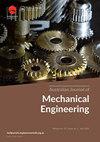Research on the mechanism and law of strip tilt induced by cold rolling intermediate roll shifting
IF 1.3
Q3 ENGINEERING, MECHANICAL
Australian Journal of Mechanical Engineering
Pub Date : 2023-09-28
DOI:10.1080/14484846.2023.2259729
引用次数: 0
Abstract
ABSTRACTEnsuring product quality requires the accurate detection of strip flatness during cold rolling. For cold rolling mills with intermediate roll shifting control, the uneven stiffness induced by the shifting process can cause the strip to tilt in the mill, which can affect the accuracy of strip flatness detection. In this study, the strip tilt is defined, and a finite element model of the S6-high mill is constructed using ABAQUS software to study the strip’s deflection and flattening behaviour during the rolling process and the effect of different rolling process parameters on the strip tilt. The specific spatial position of the rolls during the rolling process is also examined, and the main structure of the mill is identified as the primary cause of strip tilt. This research provides a theoretical basis for the strip’s absolute position change in the rolling process, which can enhance the measurement accuracy of flatness detection roll in the future.KEYWORDS: Tilting of stripfinite element analysisroll deflection Disclosure statementNo potential conflict of interest was reported by the author(s).Data availability statementThe authors confirm that the data and material supporting the findings of this work are available within the article.Additional informationNotes on contributorsTieheng YuanTieheng Yuan, Male, 1997-, Doctoral candidates, University of Science and Technology Beijing. Main research interests are: accurate control of cold rolling profile and flatness, optimal control of cold rolling automation system.Wenquan SunWenquan Sun, Male, 1982-, PhD, Associate Researcher, University of Science and Technology Beijing. Main research interests are: intelligent process modelling and control of big data, multi-process quality control of strip products, process modelling and control theory of large equipment, strip flatness and quality control of cold rolled products.Tingsong YangTingsong Yang, Male, 1996-, Postdoctor, University of Science and Technology Beijing. Main research interests are: electromagnetic assisted flatness control for cold rolling, ontelligent production stability control in continuous withdrawal process.Anrui HeAnrui He, Male, 1972-, Researcher, University of Science and Technology Beijing. Main research interests are: intelligent process control, industrial big data application, virtual simulation and digital twin.研究了冷轧中间辊移动引起带钢倾斜的机理和规律
摘要为了保证产品质量,需要在冷轧过程中对带钢板形进行准确的检测。对于采用中间换辊控制的冷轧机,换辊过程中产生的刚度不均匀会导致带钢在轧机内倾斜,从而影响带钢板形检测的精度。本文定义了带钢倾斜度,利用ABAQUS软件建立了s6辊轧机的有限元模型,研究了带钢在轧制过程中的挠曲和扁化行为,以及不同轧制工艺参数对带钢倾斜度的影响。研究了轧制过程中轧辊的具体空间位置,确定了轧机的主要结构是导致带钢倾斜的主要原因。该研究为轧制过程中带钢绝对位置的变化提供了理论依据,可为今后提高板形检测辊的测量精度提供依据。关键词:钢带倾斜有限元分析轧辊偏转披露声明作者未报告潜在利益冲突。数据可用性声明作者确认在文章中可以获得支持本研究结果的数据和材料。袁铁恒,男,1997-,博士研究生,北京科技大学。主要研究方向为:冷轧型材和板形的精确控制,冷轧自动化系统的优化控制。孙文泉,男,1982-,博士,北京科技大学副研究员。主要研究方向为:大数据智能过程建模与控制、带材产品多过程质量控制、大型设备过程建模与控制理论、带材板形与冷轧产品质量控制。杨廷松,男,1996-,北京科技大学博士后。主要研究方向为:冷轧电磁辅助板形控制、连续拔料过程生产稳定性智能控制。何安瑞,男,1972-,研究员,北京科技大学。主要研究方向:智能过程控制、工业大数据应用、虚拟仿真与数字孪生。
本文章由计算机程序翻译,如有差异,请以英文原文为准。
求助全文
约1分钟内获得全文
求助全文
来源期刊

Australian Journal of Mechanical Engineering
ENGINEERING, MECHANICAL-
CiteScore
3.70
自引率
7.10%
发文量
77
 求助内容:
求助内容: 应助结果提醒方式:
应助结果提醒方式:


